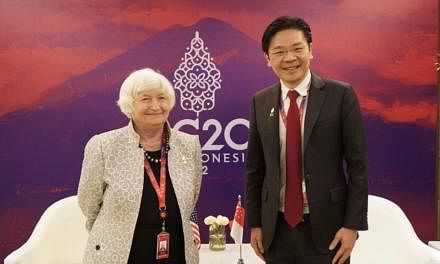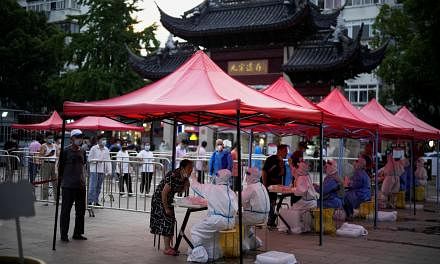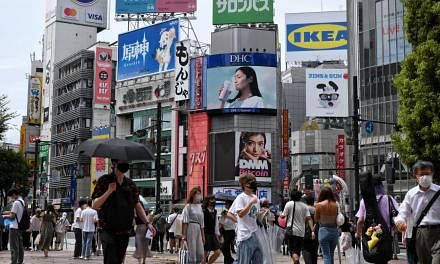LONDON (BLOOMBERG, REUTERS) - Britain will temporarily ban flights from South Africa and five neighbouring countries over worries about a new, dramatically different Covid-19 variant recently identified in the region.
The travel restrictions go into effect at noon on Friday (Nov 26) and are a precautionary measure to keep the spread of the new variant in check, Health Secretary Sajid Javid said.
In addition to South Africa, the countries covered by the new restrictions are Namibia, Lesotho, Eswatini, Zimbabwe and Botswana. These countries will be placed on Britain's red list as of Sunday, requiring British travellers to quarantine in hotels upon arrival.
Israel also has banned travel from the six countries, along with Mozambique, another neighbour of South Africa, BNO News said on Twitter, without citing the source of the information.
Scientists are still trying to determine whether the new variant, called B.1.1529, is more transmissible or more lethal than previous ones. What is clear is that it has the most mutations of any strain yet identified. That has raised concerns inside South Africa and internationally, with the authorities fearing a wave of cases that could increase pressure on already strained healthcare systems.
"As part of our close surveillance of variants across the world, we have become aware of the spread of a new potentially concerning variant," Mr Javid said in a statement, adding that the new strain is now under investigation.
"What we do know is there's a significant number of mutations, perhaps double the number of mutations that we have seen in the Delta variant," Mr Javid said.
"And that would suggest that it may well be more transmissible and the current vaccines that we have may well be less effective."
The British Health Security Agency said the variant had a spike protein that was dramatically different to the one in the original coronavirus that Covid-19 vaccines were based on. Officials characterised the variant as the "worst one yet".
Britain's move is a further blow to the airline industry, which was starting to recover from earlier travel restrictions and lockdowns but now faces fresh curbs and a resurgent virus in parts of Europe.
The measures announced on Thursday mark the biggest change in Britain's Covid-19 travel rules since the so-called traffic light system was overhauled earlier in the autumn to ease border crossings.
Up to 700 people arrive in Britain daily via South Africa on flights, a number that would normally be expected to increase in the next four to six weeks due to seasonal travel.
In South Africa, virologists have detected almost 100 cases linked to the new variant to date, according to Associate Professor Anne von Gottberg, a clinical microbiologist and head of respiratory diseases at the National Institute for Communicable Diseases.
The variant has also been found in Botswana, Hong Kong and Israel, but the British Health Security Agency said that no cases of the variant had been detected in Britain.
World Health Organisation (WHO) officials have met to discuss the variant, which has also been detected in Botswana, where it has been found in people who were vaccinated against Covid-19.
"Armed by our experience and understanding of the Alpha and Delta variants, we know that early action is far better than late action," Professor Ewan Birney, deputy director-general of the European Molecular Biology Laboratory, said in a Science Media Centre briefing note.
"It may turn out that this variant is not as large a threat as Alpha and Delta, but the potential consequences of not acting on the possibility it could be are serious."
The new variant probably evolved during a chronic infection of an immunocompromised person, possibly in an untreated HIV/Aids patient, said Professor Francois Balloux, director of University College London's Genetics Institute.
Having the world's biggest number of HIV cases has made it more difficult for South Africa to fight the Covid-19 pandemic, because the virus can linger for longer in people whose immune systems are compromised, potentially offering a bigger window for mutations.
WHO experts are meeting on Friday with the authorities from South Africa, according to British officials. It will take several weeks to see the impact of the new variant on hospitalisations and deaths and to study how it may interact with vaccines.







